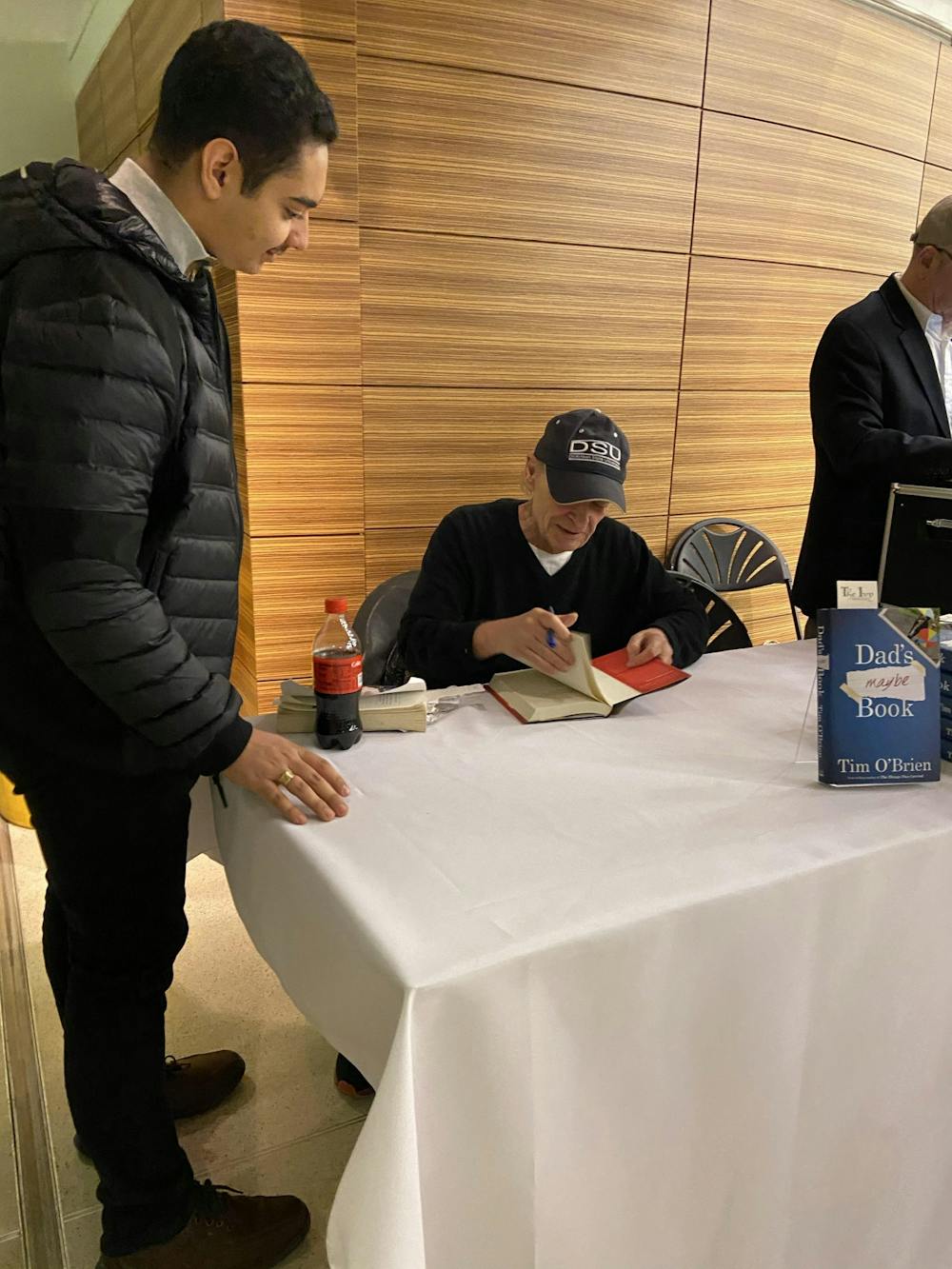Piling into the giant Remsen 1 lecture hall is not the typical Thursday evening activity for Hopkins students, but then again it isn’t every day that Tim O’Brien visits Hopkins and reads to us.
On Thursday, Feb. 27, the President’s Reading Series presented American novelist and National Book Award winner Tim O’Brien. He read from his latest work of nonfiction, Dad’s Maybe Book.
As with all Writing Seminars readings, this event was free and open to the public. Following the reading, there was a reception in Mudd Hall with complimentary food and drinks. During the reception, O’Brien spoke with and signed books (several of O’Brien’s books were also on sale to be bought at this reception) for a long line of attendees excited to meet him.
To regard O’Brien merely as a writer who is “familiar” to us would be a massive understatement. As an author lauded by school curriculums, his works (The Things They Carried, for one), are frequently analyzed, studied and written about in an academic setting.
I distinctly remember reading the entirety of The Things They Carried both in my middle and high school English classrooms and then, once again, reading several of the novel’s excerpts when I was taking a Writing Seminars workshop class as an underclassman here at Hopkins.
However, contrary to many other texts that were often shoved down our throats in our formative English education, O’Brien stands out as being an author whose works can simultaneously be enjoyed privately as well.
O’Brien began by reading “Skin,” chapter four from Dad’s Maybe Book. He then paused to explain that he was going to spend his time reading various chapters from this book, but in no particular order.
He noted that this was due to the randomness and lack of unity inherent in everyday life.
“There will be no thematic unity because my life has gestured that there is not unity, or if there is unity, I have never been able to find it,” he said.
Following this interjection, O’Brien read “A Letter to My Son,” the first chapter in Dad’s Maybe Book.
The reading was deeply emotional as the letter included his own personal fears of becoming a dad at an older age and pointed out some of the most difficult aspects of fatherhood — such as facing one’s own mortality while pondering the life of one’s child.
Most notably, his voice ached with passion as he addressed his son and read, “I’m in love with you.”
It was at this point that my friend turned to me teary-eyed and mouthed: “After this, I’m going to call my parents.”
Incredibly self-perceptive and aware of his public image, O’Brien also took a moment to express his disdain at being coined a “war writer,” drawing the analogy that it would be strange to call somebody who wrote about oceans an “ocean writer.”
Furthermore, among the pieces he chose to read, the story that sparked the most laughter, and perhaps most reaction from the audience was “Trusting Story,” chapter five from Dad’s Maybe Book.
A rather deceptive and surprising tale, “Trusting Story” details O’Brien’s experience speaking at the Sewanee Writers’ Conference, where he told a fictional account of his son’s first words and was later accosted by somebody who was deeply offended by O’Brien’s supposed fabrication.
It is a story centered on the craft of writing and nods to the writer’s liberty to alter “facts” for the sake of story-telling.
This story also affected me the most out of all the ones O’Brien chose to read; for me, it examined the relationship of fiction to truth.
In fact, O’Brien suggested that perhaps there is no relationship in existence. He also does not think it’s necessary.
“Fiction writers always lie — that’s the job,” he said.
My initial reaction to this statement was that I found it dramatic, cynical and reductive. Even so, I could not dismiss it over the next few days.
For me, fiction has always been about the truth. I have always deeply believed that fiction gives writers the space and distance to represent reality in a way that is even more honest than non-fiction, because without a dedication to hard facts, fiction can be about the true essence of anything and everything.
To hear O’Brien claim what seemed to be the opposite of my core values regarding writing was startling and honestly borderline shattering.
However, after a few days of digesting this reading, I’ve come to the conclusion that these statements which stunned me could potentially point to a more positive outlook on writing — that because as a writer you can lie, the craft of writing itself becomes a form of liberation and freedom.
Or maybe, O’Brien’s statement just doesn’t need to be taken so seriously and existentially. Either way, the reading itself was so intellectually stimulating and significant that I am still just not over it.





